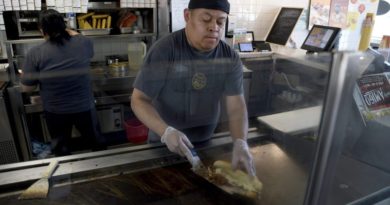The 'Elon Paradox': He sells Teslas–but you'd expect him to drive a Ram. Here’s what your car says about your politics
Politics, cars, and the internet collided when Florida Gov. Ron DeSantis officially began his presidential campaign in a Twitter interview with Tesla CEO Elon Musk. While unconventional, the launch was in some ways fitting. Mr. DeSantis’ chief challenge, to borrow from a 2016 Barack Obama line, is convincing GOP voters they are ready for “that new car smell.”
Buying a car, after all, is a lot like choosing a president.
It’s a major decision, one that Americans typically live with for about eight years. Like voters, prospective buyers do significant research and comparison shopping. They consider performance, reliability, appearance, and how promised benefits might meet their needs.
Yet while facts matter, buying a car remains a very emotional decision, often more heart than head. How does the car make me feel? What will it make others feel about me?
More than any other consumer purchase, your car choice–much like your vote–is an expression of your personality, your values, and yes, even your politics.
We’ve been tracking the politics of consumers for 20 years by analyzing the Nielsen Scarborough and GfK MRI datasets, which include hundreds of thousands of annual in-depth interviews with American adults. We’ve explored the partisan differences among beer drinkers, sports fans, fast-food eaters, and retail shoppers. Car owners are one of the more intriguing consumer groups.
Today, when it comes to the politics of cars, it’s a Ram v. Tesla world
As the bubble chart shows, Ram pickup owners are very, very Republican, with GMC drivers registering a close second. GOP drivers clearly love their made-in-the-USA trucks and SUVs. (Notably, the British brand Land Rover, formerly a high-R index brand, has moved to the center-left as it has become more of a luxury line appealing to urbanites.)
On the other side, Tesla is the most Democratic car make by a long shot. Its position is unsurprising given one of its key selling points–no carbon emissions–is a priority for progressives. The Tesla lineup also currently lacks a truck or big SUV, favored by Republicans.
Politically, Tesla has occupied the space previously held by Subaru in 2012 and Volvo in 2004 on the automotive left. Over time, both those carmakers’ bubbles have migrated toward the less partisan middle as they have grown their market shares.
Residents of the San Francisco area–home to Elon Musk’s Twitter–have the nation’s highest concentration of Tesla owners, more than three times the national average, according to the Nielsen Scarborough data. The next top Tesla markets are also Democratic strongholds: Denver, Honolulu, and Los Angeles.
Over the past year, the politics of Tesla drivers and those of Mr. Musk have diverged sharply. Mr. Musk’s partisan evolution has created what we call the Elon Paradox–he is selling Teslas, but you might expect him to be driving a Ram.
The Elon Paradox generates political headwinds for Tesla sales. A November 2022 Morning Consult survey revealed that Tesla’s net favorability among Democrats had declined by 20 percentage points. The December Quinnipiac poll showed only 7% of Democrats holding a favorable opinion of Mr. Musk.
While it may be too soon to know whether Democrats’ increasingly negative opinions of Musk will hurt Tesla sales, a golden rule in politics and business is that you don’t want to get out of step with your base.
One way to address such a divergence is to grow your customer base. And Mr. Musk has a plan.
The new Tesla Cybertruck is slated to go on sale later this year–and, according to early reports, demand is off the charts. Mr. Musk has no problem jumping the lengthy reservations list: He announced at Tesla’s recent shareholder meeting that the Cybertruck will be his daily driving vehicle.
In March, Musk tweeted, “Cybertruck will change the look of the roads. Finally feels like the future.” That future seems to be one in which truck and big SUV buyers will be making their first Tesla showroom visit, broadening the brand’s political base, and marking another milestone in the supernatural resilience Musk has shown in his business career.
Mike Shannon is a partner at the management consulting firm Vianovo in Austin, Texas. Will Feltus is the senior vice president for research and planning at National Media in Alexandria, Virginia.
The opinions expressed in Fortune.com commentary pieces are solely the views of their authors and do not necessarily reflect the opinions and beliefs of Fortune.



